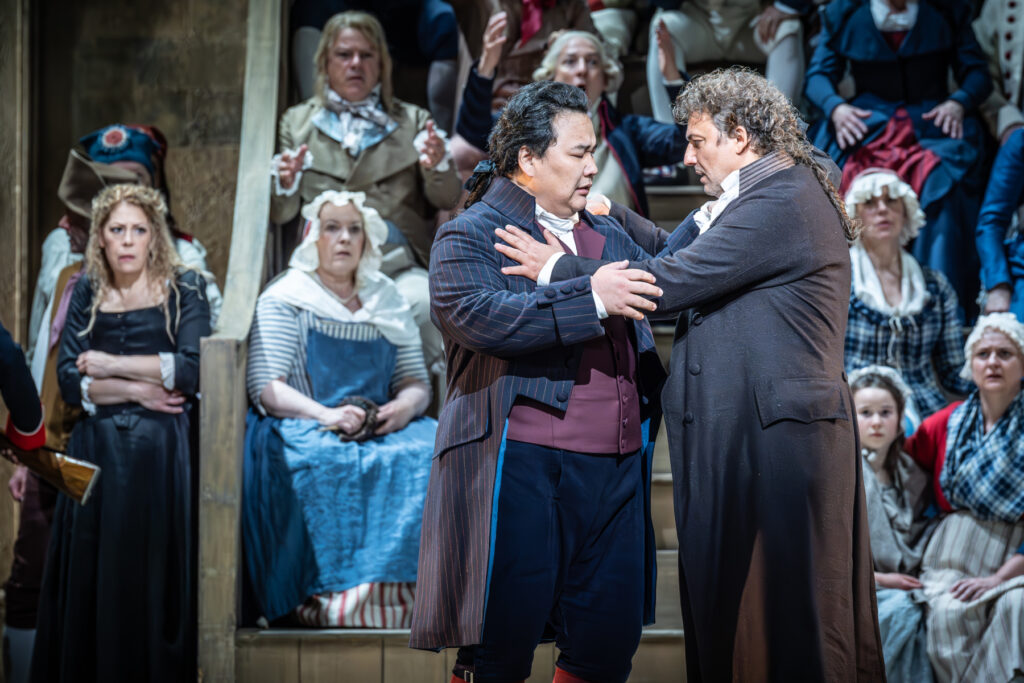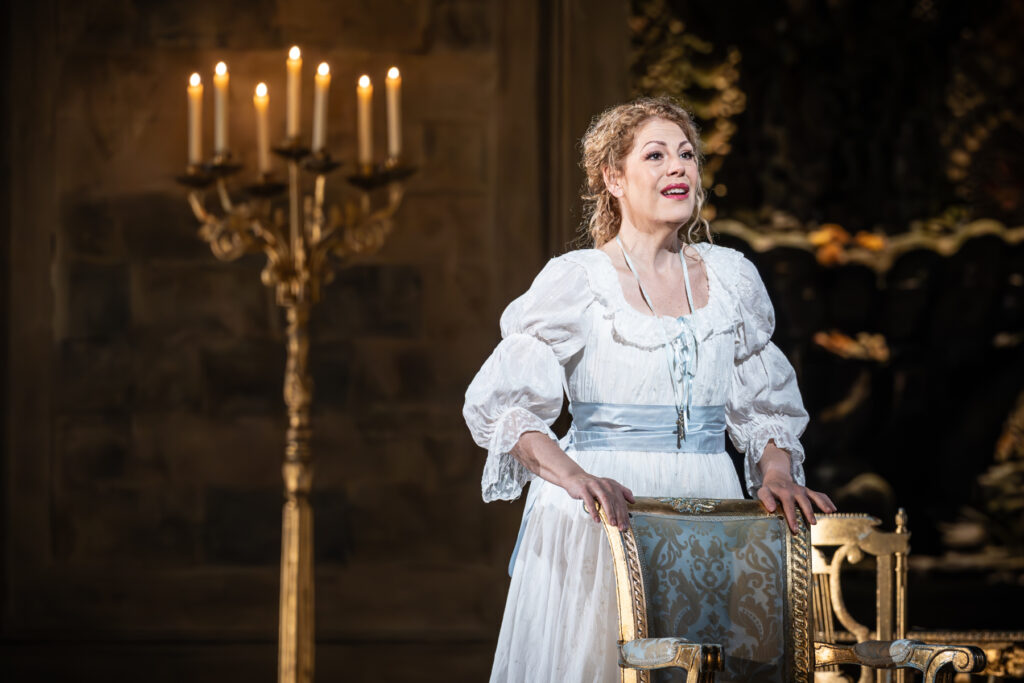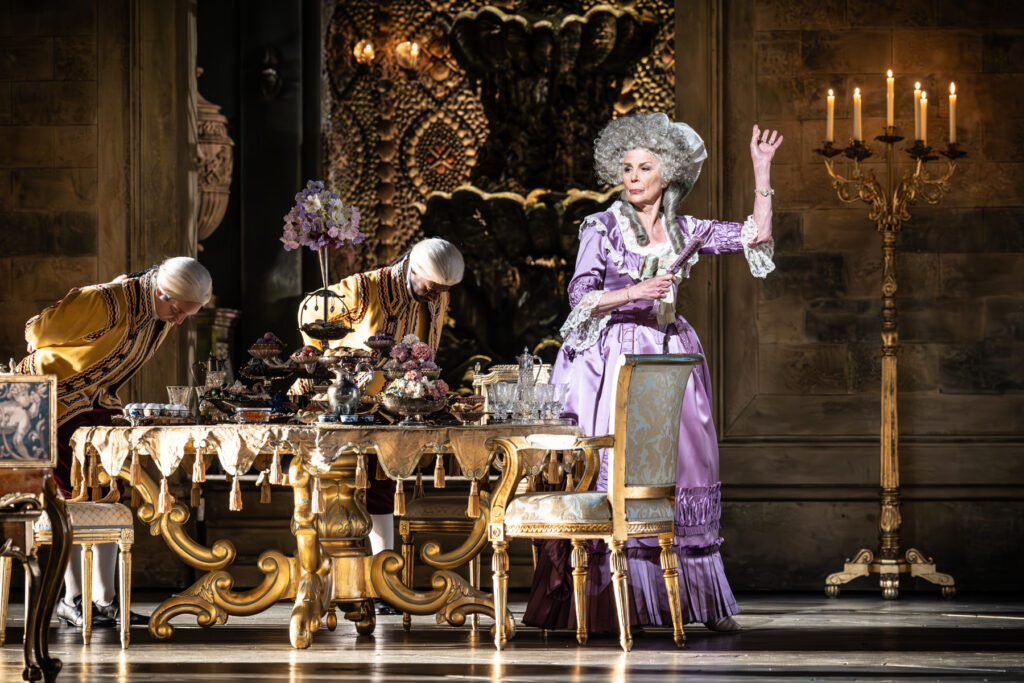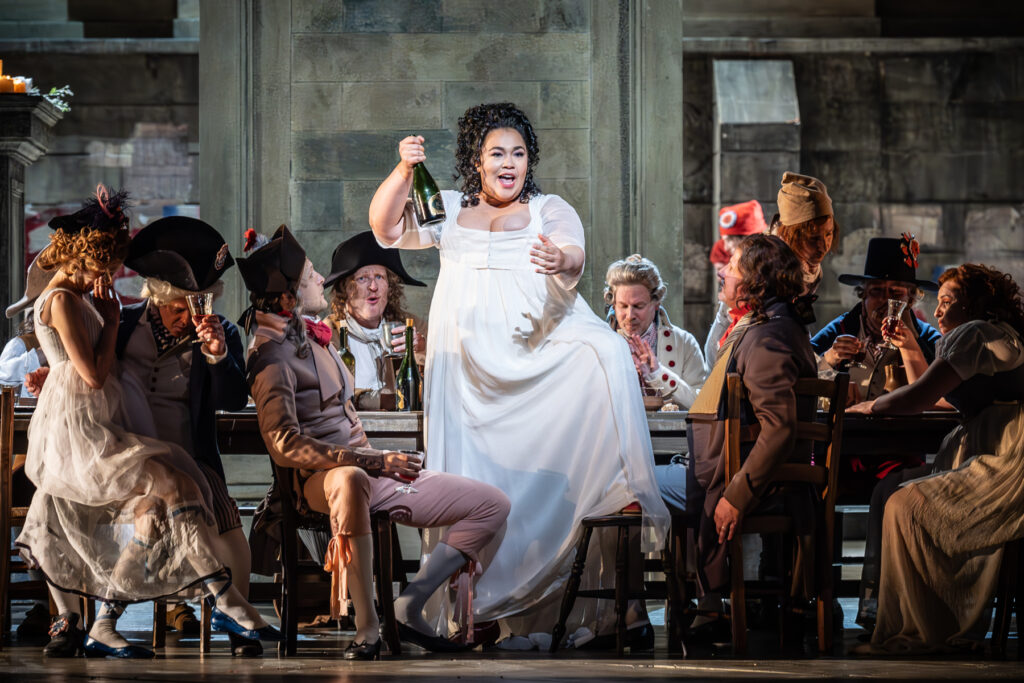Andrea Chénier is perhaps not an opera for purists, but there is no denying that it ends in a blaze of glory. Chénier and his beloved Maddalena exultantly greet the dawn – and death at the guillotine – before the orchestra’s spectacular final peroration. In a characteristically astute move, Antonio Pappano has chosen Giordano’s rip-roaring epic to round off his tenure as Music Director of the Royal Opera House. He conducted the production, directed by David McVicar, when it was new in 2015 and Jonas Kaufmann has returned in the title role of the idealistic, but doomed poet.
At Pappano’s farewell gala in mid-May, Kaufmann sounded subdued in extracts from La forza del destino and he has never been the kind of tenor who brings ‘go-for-broke’ showmanship to a role. This Chénier at first seems an elegant gentleman rather than an impulsive romantic. His singing (apart from a glitch in the quiet opening of the Act 2 love duet) is secure, sensitive and distinctively bronze-toned – if not overwhelming in its power or passion. His most gripping, heroic moment comes with his Act 3 solo, ‘Si fui soldato’ as he eloquently pleads his case before the Revolutionary Tribunal.

The chemistry is strong between Kaufmann and his livewire Maddalena, Sondra Radvanovsky. Judicious in her use of her potentially formidable voice (she takes on Turandot for the Royal Opera next season), she sings with a wealth of nuance and can spin a delicate thread of sound. Her acting is similarly detailed and she makes a convincing transition from the pampered, if questioning young aristocrat of Act 1 to the desperate woman of Act 2. In Act 3 she shapes ‘La mamma morta’ to compelling effect. Her voice has always been most striking in its gleaming upper reaches and, after some artful technical management in the aria’s low-lying opening narration, it blazes in the final section.
The most opulent sounds on stage originate from the baritone Amartuvshin Enkhbat as Carlo Gérard, the servant turned influential Jacobin. Across its compass his voice is astonishing for its richness, warmth and solidity. He phrases with style and sincerity, his presence is sympathetic – perhaps too sympathetic for this conflicted and volatile, if ultimately honourable class warrior – and he makes telling, economical use of physical gesture. Strangely, though Gérard is the opera’s most interesting character, Enkhbat only intermittently raises the dramatic temperature. This is partly attributable to the way his words, though firmly and roundly articulated, remain nestled in the splendid upholstery of his tone rather than springing into the auditorium.

There is no shortage of immediacy in the supporting roles that bring the action to quasi-cinematic life: Katia Ledoux’s lush-voiced and charismatic Bersi; Rosalind Plowright’s spiky Contessa di Coigny; William Dazeley’s vaporous Fléville; Aled Hall’s incisive Abbé (really making the text tell); Ashley Riches’ warmly solicitous Roucher; Alexander Kravets’ reptilian Incredibile; James Cleverton’s sparky Mathieu, and Jeremy White’s gruffly pragmatic Schmidt. Special mention must be made of Elena Zilio, now something of an institution in such roles as old, blind Madelon, who gives up her grandson so that he can fight for the Revolution. She duly wrings every wither.

McVicar’s production, revived by Thomas Guthrie, is characteristically skilled in its stagecraft, especially in the action-packed Act 3. As the same time it is oddly unatmospheric – even antiseptic. As in the director’s Royal Opera productions of Figaro and Adriana Lecouvreur, there is some conspicuous floor-sweeping going on, but this entire Reign of Terror looks incongruously spick and span. The pinnies of the citoyennes are immaculately starched and ironed and, when a tumbril passes behind the rectangular arches of Robert Jones’s monumental set, the shirts of its condemned passengers gleam blindingly white under the spotlights. So much for the squalor of incarceration.

Showing no fear of getting his hands figuratively dirty, Antonio Pappano engages fully with Giordano’s score – colourful, red-blooded, veering between short-breathed hyperactivity and sweeping lyricism – and welds each act into a coherent span. The orchestra responds with zeal and precision and the chorus relishes its various roles, not least its opportunity to float some exquisite lines in the pastoral interlude staged at Château Coigny in Act 1. If we might have expected Pappano to choose a more venerated work to mark his departure from the Royal Opera House, Andrea Chénier – vigorous, open-hearted and irresistibly theatrical – makes an apt final flourish.
Yehuda Shapiro
Andrea Chénier
Music composed by Umberto Giordano
Libretto by Luigi Illica
Cast and production staff:
Jonas Kaufmann – Andrea Chénier; Sondra Radvanovsky – Maddalena de Coigny; Carlo Gérard – Amartuvshin Enkhbat; Bersi – Katia Ledoux; Contessa di Coigny – Rosalind Plowright; Pietro Fléville – William Dazeley; The Abbé – Aled Hall; Major-Domo — Simon Thorpe; Roucher – Ashley Riches; The Incredibile – Alexander Kravets; Madelon – Elena Zilio; Mathieu – James Cleverton; Fouquier-Tinville – Eddie Wade; Schmidt – Jeremy White
Director – David McVicar; Revival Director – Thomas Guthrie; Set design – Robert Jones; Costumes – Jenny Tiramani; Lighting – Adam Silverman; Choreography and movement – Andrew George; Conductor – Antonio Pappano; Chorus and Orchestra of the Royal Opera House
Royal Opera House, London, 2 June 2024
Top Image: A scene from Andrea Chénier
All photos by Marc Brenner.